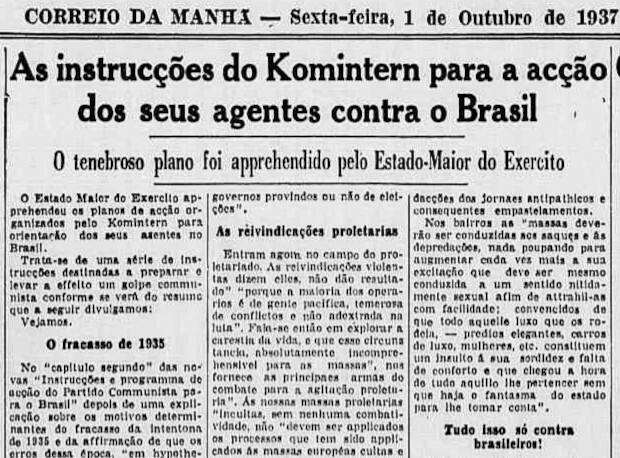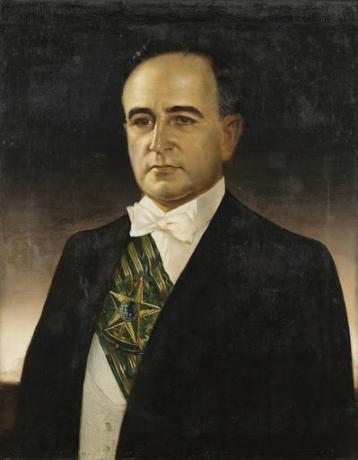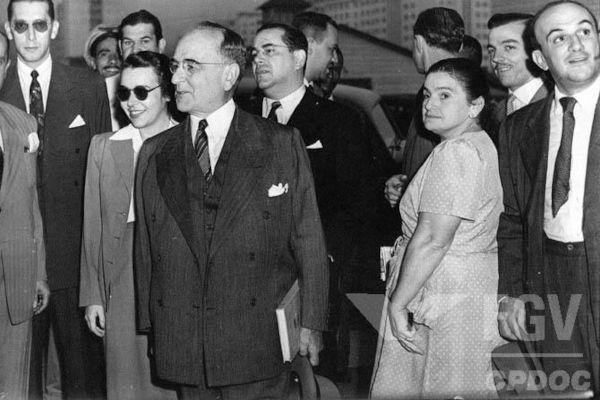O Cohen Plan it was an alleged attempt to seize power by the communists in 1937. He was denounced by Vargas on the radio and was used as a justification for the coup d'état that installed the dictatorship of the Estado Novo, on November 10, 1937. Years later, the plan was proven to be false and that his real intention was to serve as a justification for Getúlio Vargas to install a dictatorship in Brazil.
Read too: How many coups d'etat have there been in Brazil since independence?
What was the Cohen Plan?
The Cohen Plan was a document obtained by the government of Getulio Vargas, in September 1937, in which the communists organized to take power in Brazil. This supposed plan foresaw the mobilization of workers to join a general strike, fire of public buildings and even the physical elimination of authorities who tried to prevent the alleged revolt communist. According to the government, the plan would have been drawn up by the Communist International.
The high military leadership of the time presented the Cohen Plan and, soon after,
the document was released by the press, generating commotion throughout society. Vargas used this to articulate the cancellation of the presidential elections in January 1938 and, thus, continue in government.Origins of the Cohen Plan

The 1930s was marked by the ideological incitement between nazi-fascists and communists. From the debate of ideas, we moved to physical and armed confrontation, starting with Europe and spreading to other countries, like the Brazil. Groups were formed inspired by these two ideologies. This is the case, in Brazil, of the National Liberation Alliance (ANL), on the communist side, and of the Brazilian Integralist Action (AIB), of fascist inspiration.
Since the enactment of 1934 Constitution, Getúlio Vargas expressed his concern with the weakness of legislation to curb ideological confrontations and maintain social order. The following year, it happened to Communist intent, in Rio de Janeiro and Natal (RN), an armed uprising organized by the ANL to oust Vargas from power and install a communist government in Brazil. Although, the government troops defeated the insurgents. It is worth mentioning that the workers did not join the communist cause, due to the labor rights granted by the government.
Do not stop now... There's more after the advertising ;)
In 1937, Vargas' presidential term ended, and the presidential elections were being prepared. Candidates for the position were already organizing to run an election campaign. However, Vargas, who came to power soon after the victory of 1930 revolution, showed his interest in remaining in the presidency, but still had no justifications to convince the population of the need for it. His continuing plan ran into resistance from some governors, like Flores da Cunha, from Rio Grande do Sul.

1937 coup
the coup d'etat led by Getúlio Vargas, on March 10, 1937, he began the dictatorship of the new state. On the same day of the coup, Congress was closed; political parties, extinct; and individual freedoms, suspended. Furthermore, the 1934 Constitutionwas canceled and another Charter was granted. THE 1937 Constitution, written by jurist Francisco Campos, granted Vargas wide powers to govern Brazil. Without the Legislature, the president himself made the laws.
It is worth recording what was exposed in the preamble of the 1937 Charter|1|:
"Given the legitimate aspirations of the Brazilian people for political and social peace, deeply disturbed by known factors of disorder, resulting from the growing recording of partisan disagreements, which a notorious demagogic propaganda seeks to denature into class struggle, and from the extreme, of ideological conflicts, tending, by their natural development, to be resolved in terms of violence, placing the Nation under the disastrous imminence of civil war; Taking into account the state of apprehension created in the country by the communist infiltration, which day by day becomes more extensive and deeper, demanding radical and permanent remedies; Considering that, under the previous institutions, the State did not have normal means of preserving and defending peace, security and the well-being of the people; Without the support of the armed forces and giving in to the inspirations of national opinion, both were justifiably apprehensive about the dangers that threaten our unity and the speed with which our civil and policies"
Note-dry the participation of the Armed Forces in the coup of State led by Getúlio Vargas and the intentions of the Constitution of 1937 were justified in the attempt of the communists to seize power. The installation of a dictatorship in Brazil, that is, the concentration of powers in the presidency of the Republic, had as an argument the maintenance of national order and the fight against communism.
See too: Right and left: what do these terms mean in politics?
Disclosure of farce
In 1945, the Estado Novo dictatorship was losing strength and censorship was not as active. O General Góis Monteiro, taking advantage of the crisis of the Vargas dictatorship and with eight years of delay, revealed that the Cohen Plan was a scam.
According to him, the person who delivered the document to the Army's General Staff was Captain Olímpio Mourão, who was head of the Secret Service of the Brazilian Integralist Action. Mourão acknowledged the falsehood of the plan and stated that it was for use restricted to the AIB. The captain accused Góis Monteiro of using the plan improperly and that he did not accuse the farce before by because of military discipline, that is, he could not question the actions of his superiors. hierarchical.
With the revelation of the farce and the involvement of the AIB, Plínio Salgado, its greatest boss, spoke about the Plan Cohen, stating that he did not denounce the falsehood of the document so that the Armed Forces would not be demoralized. In November 1937, when the plan was used to justify the Getúlio Vargas coup, Plínio Salgado was a presidential candidate and gave up his candidacy to support the Estado Novo dictatorship.

Consequences of the Cohen Plan
The consequences of the Cohen Plan are linked to the coup d'état led by Getúlio Vargas, on November 10, 1937, which inaugurated the Estado Novo dictatorship. The document, despite its farce, served as a pretext for Vargas to get the population's support for his continued project of power, as well as an alliance with the Armed Forces.
See too: Consolidation of therehere is labor in the Vargas era
Cohen Plan Summary
The Cohen Plan was a document released by the Getúlio Vargas government in 1937, which served as a pretext for the coup d'état that started the Estado Novo dictatorship in November of the same year.
Although the communists rebelled against Getúlio Vargas in 1935, in the Communist Intentona, there was no plan to take power in 1937.
The 1937 coup annulled the 1934 Constitution and granted a Charter that gave Vargas wide powers. In addition, Congress was closed, political parties were dissolved and individual freedoms were suspended.
The farce of the Cohen Plan was only revealed in 1945, when the Estado Novo was in crisis. General Góis Monteiro disclosed the falsehood of the document, and those involved claimed military discipline and not demoralization of the Armed Forces to justify the silence about the farce.
solved exercises
Question 1 - The Cohen Plan was a document released by the government of Getúlio Vargas, in September 1937, which brought an alleged attempt by the communists to take power in Brazil. This plan served as justification for Getúlio Vargas:
A) approach the Communist Party in search of a truce in the name of social order.
B) anticipate the 1938 presidential elections to guarantee democracy in Brazil.
C) launch a coup d'état and implement the dictatorship of the Estado Novo.
D) ask the United States for help in fighting communism.
Resolution
Alternative C. Getúlio Vargas used the Cohen Plan as a justification for launching a coup d'état, installing a dictatorship and obtaining broad powers. Thus, the presidential elections of 1938 were cancelled.
Question 2 - In 1945, the Estado Novo dictatorship, led by Getúlio Vargas, was in crisis. General Góis Monteiro took advantage of this moment to affirm that the Cohen Plan, denounced by the government in 1937 and used as a justification for the Estado Novo coup:
A) remained current, as communism never ceased to be a threat to Brazil.
B) was a farce by the Vargas government to justify the coup d'état.
C) should be used again by Vargas to stay in power.
D) was an American imposition in exchange for loans for industrialization.
Resolution
Alternative B. General Góis Monteiro denounced the farce of the Cohen Plan only in 1945, that is, eight years after the document was released. Those involved in this farce defended themselves saying that they did not denounce before for disciplinary reasons and not to demoralize the Armed Forces.
Note
|1| Text of the 1937 Constitution available on here. Accessed on April 12, 2021.
By Carlos César Higa
History teacher

